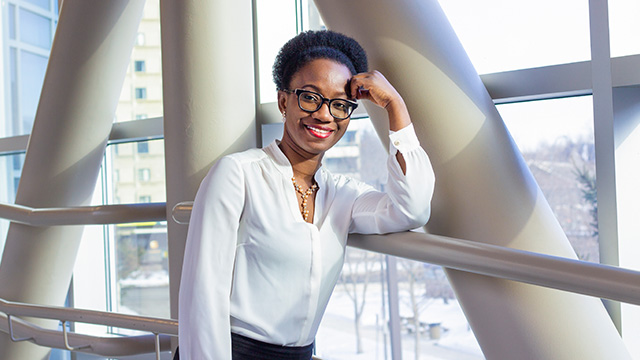
Irehobhude ("Ireh") Iyioha, a professor of health law, ethics and policy at the John Dossetor Health Ethics Centre in the Faculty of Medicine & Dentistry (FoMD)
Irehobhude ("Ireh") Iyioha, a professor of health law, ethics and policy at the John Dossetor Health Ethics Centre in the Faculty of Medicine & Dentistry (FoMD), is tackling issues like discrimination and ineffective laws and policies in health-care systems. A prolific researcher, human rights advocate and public speaker, Iyioha is working to ensure safe and equitable treatment for marginalized groups who are less able to advocate for themselves.
Her efforts have garnered a long list of accolades, includingAvenue Magazine's 2018 Top 40 under 40 and making U of A history as the first black woman to hold a full-time faculty position with the Faculty of Law. In December 2018, Iyioha was one of six people across Alberta to receive the Stars of Alberta Award for her commitment to volunteerism.
"What led me into health was the loss of my mother," Iyioha said. "My mother died very suddenly from the negligence of a physician, so I started thinking about what could be done to reduce the incidence of medical fatalities from physician negligence."
Iyioha's mother,Patricia, was a well-known activist, educator and community role model. Her death significantly influenced Ireh's career decisions-including graduate studies on medical negligence and the regulation of experimental therapies, and founding the Patricia Eromon Iyioha Foundation Fund (PEIF Fund), an organization that supports children living in poverty and in conflict through a service-mentorship exchange program targeted at young professionals. These were issues that Iyioha's mother was passionate about and fought to realize in her time.
Where compassion, health and law intersect
TheJohn Dossetor Health Ethics Centre is the only interdisciplinary, academic health ethics centre in Alberta and one of the first in Canada.
"For the most difficult ethical questions that come up in a hospital setting, the 'go-to' place is the Dossetor centre. They have an amazing group of experts from different backgrounds who bring their knowledge to support the decision-making process," Iyioha explained.
Iyioha's work draws on her legal education and lived experience. As an immigrant woman and mother who has faced discrimination herself, she said her goal is to apply her training as a lawyer to address hidden barriers in the system and ensure people are able to access the services they need.
"Given the diversity of the Canadian population, the most pressing issue for me in my research is finding ways that law can be more effective for marginalized populations," Iyioha said.
According to Iyioha, implicit and explicit bias in health care are common occurrences that create barriers for people. Social factors like race, language, culture and different belief systems can directly affect the care people receive and the way they are treated. These factors can also affect the way they understand medical processes like consent.
"I take a very critical approach to the study of law to determine if law is working, or where it is failing. I take a similar approach to health-care policies and question things about them that may not have been noticed before, so I am able to say, 'That's not working, and this is why.'"
Deploying skills for community and connection
When she is not lecturing or conducting research, Iyioha volunteers in support of child nutrition programs, professional growth for women and youth, and health care for people of black, African-Canadian and Caribbean descent living with HIV/AIDS. She also sets aside at least an hour a day to write literary fiction after her two children are asleep. She has been published in several literary publications in North America, Africa and Europe, including in Harvard University's Transition Magazine, and received a special commendation from the judges of the Caine Prize in London.
"People always ask me why I am interested in these different things. I just grew up knowing that sometimes you are blessed with more than one talent, and you're able to achieve so much more than the confines that are created by your mind or society," Iyioha said.
"I woke up one day and decided I was going to explore every possible talent that I was given, to find ways in which I can use those different skills to address issues that matter. I realized early-even before I was trained as a lawyer-that I was very much concerned about issues of social justice, especially for the marginalized and vulnerable."
"The hope always is to have a better society for the next generation."